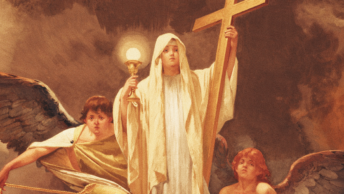On the Fourth Sunday of Easter, the Church always emphasizes the importance of vocations and of seeking God’s guidance as we choose our careers, and sometimes on this occasion I like to ask our fourth graders in school what occupations they might like to have as adults. As you might expect, there’s a wide variety. Ethan would like to be a YouTube creator, as it would allow him to have fun while making money. Both Claire and Paisley want to be artists, as they love coloring, painting, and drawing. Mary Kate enjoys helping people, so she’d like to be either a nurse or someone who takes care of sea animals. Several of the girls mentioned a desire to be a veterinarian: Gracee because she loves animals and considers all of them cute, Rayna because, as she says, “it’s the perfect job for me, plus it gives a lot of money,” and Erin because she has dreamt about it all her life—and because, she says, she’s so good with animals that her family calls her the “pet whisperer.” Christopher mentioned a related occupation, saying, “I would like to be a scientist and study wild life.” An entirely different direction is being considered by Sophia, who would like to be a waitress who makes smoothies for her customers, or a baker.
One of the most ambitious students is Audrey, who writes, “I have two options for what I want to be when I grow up: a fashion designer and a singer.” She already has a clever name for her clothing line, but I won’t mention it lest someone be tempted to steal it; in regard to being a singer, she writes, “I want to make songs about me and my real life. I don’t know how to get songs on the radio, but I will find out.” Kayley—who’s the daughter of one of our teachers—says that the war in Ukraine inspired her desire to become an Air Force pilot; that way she can protect our country, and also do air shows for people to watch. Mason at first wanted to be a chocolatier, but then changed his mind completely, and now wants to be an engineer for NASA. Charlotte has had a camera since age five, and wherever she goes makes memories by taking pictures—so she’d like to be a professional photographer. Danny would like to be both an NFL quarterback and a major league baseball pitcher; that’s what I would call thinking big. Finally, having grown up on a farm myself, this one is my favorite. Joseph would like to be either a farmer, which is fun because he lives on a farm—though he knows it’s hard work—or he’d like to be a priest, partly because he’d be praying while he works.
Listening to young people’s hopes for the future can be interesting, amusing, inspiring, and entertaining; it can also cause us to reflect on our own lives. In terms of our careers or goals in life, we might have some regrets or disappointments; most likely there were some surprises, and perhaps things turned out better than we expected. Probably we have some unanswered questions, or wonder how things would have worked out if we had made different choices. One thing is beyond dispute, however. Jesus has called, and continues to call, each one of us, and only by listening and responding can we find true happiness and peace. This, in fact, is part of what the idea of stewardship refers to: choosing wisely by making good use of the talents, opportunities, and life that God has given us, instead of wasting these things or frittering them away on unimportant and unsatisfying diversions. Jesus states that He came so we might have life abundantly. He is the only gate or entryway leading to eternal life, and we become truly alive only by living in Him.
On what is unofficially known as Good Shepherd Sunday, Jesus identifies Himself as the true Shepherd (John 10:1-10) who calls His own sheep by name. Sheep, however, can be foolish and stubborn creatures. That’s why St. Peter (1 Peter 2:20-25)—after noting that we have been healed by the wounds of Christ—states, “You had gone astray like sheep, but you have now returned to the shepherd and guardian of your souls.” A very specific example of turning back to Christ is presented in the Acts of the Apostles (2:14, 36-41) when Peter and the other apostles urged the people of Jerusalem to repent of having rejected Jesus and handing Him over to be crucified. This preaching on the day of Pentecost bore great fruit; three thousand persons were baptized that very day, thus entering into the abundant new life Jesus promises.
What does it mean to follow Jesus as our Shepherd, and to live as members of His flock? We might say the answer is summed up in the word stewardship: recognizing that everything we have comes from God, and using our time, abilities, and material resources in a way that glorifies Him, even as it meets our own needs. This attitude or set of priorities enables us to assist other members of the flock and to remain faithful followers of the one true Shepherd. For instance, God gives us time as a way of preparing for eternity, and this means we should pray every day—ideally on a regular schedule, but also at odd moments when the opportunity arises. We should also use some of our time to learn more about our faith, to volunteer in our parish or community, and to assist others when unexpected needs or emergencies arise. God also gives us our talents—not only for our own benefit, but also for the well-being of His people. This means we should seek His guidance in how best to use our abilities and opportunities, including decisions about our careers or vocations; it also means we should offer up our daily work at home or on the job as a prayer for His glory, and be willing to get involved when someone asks for our assistance. God lastly gives us our treasure, meaning money and material possessions; these things can help prepare us for the everlasting treasures of Heaven by learning and practicing the virtues of obedience, generosity, and trust. This means never treating money or earthly success as an end in itself, never valuing material things more than other people and our own personal integrity, and financially supporting the Church and other charities of our choice as much as we can. In particular, tithing, or giving away 10% of our income, allows God’s grace to flow into our lives in amazing ways, and demonstrates our sincere desire to live as truly committed followers of Jesus.
When we hear young people express their hopes for the future, we may want to warn all the future athletes to have a back-up plan in case their dream of a pro career isn’t realized, or advise the future veterinarians to start learning everything they can about animals, or tell the future scientists and engineers and nurses to do their best in school right here and now—and all of this is good advice. Today Jesus does the same thing for us, telling us that if we wish to live in His Kingdom one day, we must begin right now to recognize and listen to Him, to ignore the false and harmful voices of this world, and to follow Him alone as our Shepherd. Only in this way can we be sure of truly having life, and of having it more abundantly.








